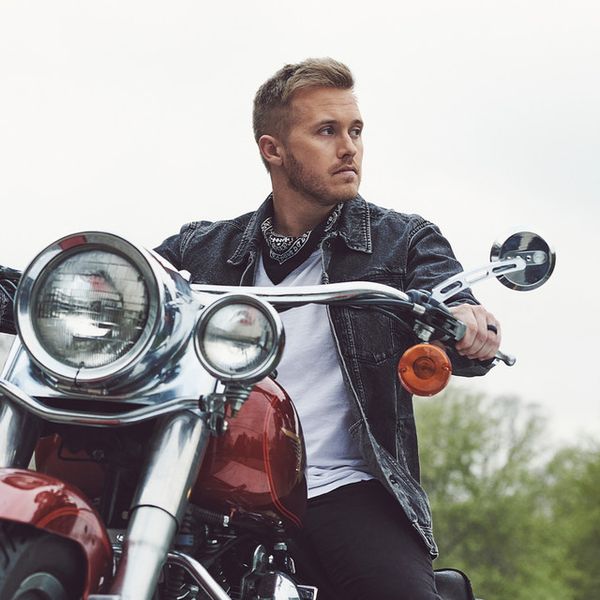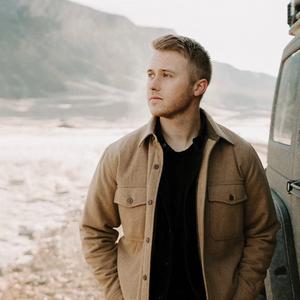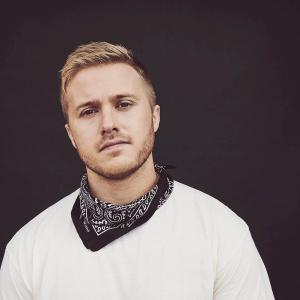




Link copied

On a nearly picture perfect spring day in Nashville, Tennessee, Corey Kent sits perched inside the offices of Sony Music Nashville. He's calm and collected as he talks about the journey to his major label debut album, Blacktop.
During what could have been a run-of-the-mill chat with one of country music's newest up-and-comers, Kent shared what can only be described as a deep, innate love for his craft.
With a truly romantic sentiment behind his words, the Oklahoma native explains to Holler that his path to now standing on the precipice of Blacktop can be summed up in a handful of words: western swing, Willie Nelson, graduating early, learning how to write songs and paying his dues.
His overwhelming love for music and addiction to the spotlight first began in his pre-teen years as he was chosen to be the frontman for a western swing band. After a handful of years and hundreds of hours of putting in the work both onstage and behind the curtain, a 17-year-old Kent eventually found himself sleeping in his Chevy Avalanche on the outskirts of Nashville, ready to jump into the city's bustling music community.
Four years later, he explains how he emerged with his first publishing deal but no real traction in regard to his career as an artist. After leaving Nashville and heading to Texas before the onset of the pandemic, Kent received a silver bullet in the form of a little tune named 'Wild As Her'. As he was employed at a pavement company in Dallas, he could've never imagined the heights that this one song would take him to, including to the top of the country radio charts.
Throughout our conversation, Kent exhibited a level of utmost thoughtfulness for the art that he creates and excitement for Blacktop to formally introduce him into mainstream country music.
You’re not new to making music, but this is your first major label project. Tell me a little bit about your journey to Nashville.
I jokingly say that I didn't choose country music, country music chose me. When I was 11 I got the invitation to become the frontman for a western swing band, which is essentially like Dust Bowl era country music with some jazz thrown in. There were some Hall of Famers that wanted to pass this genre of music on to the next generation by teaching some kids how to play and tell them about its heritage. They chose me to be the frontman and lead singer, and I was interested because I found out that you could actually make money playing music. I said, “Sign me up for that job! I don't know what kind of music this is, but put me on a stage, let me play and I'm happy!”
That band was only supposed to play one show at Cain’s Ballroom for Bob Wills’ birthday bash. We were opening for Asleep at the Wheel and the Texas Playboys, iconic bands of that genre. What was supposed to be one show ended up being five years of touring all across the country, opening up for Roy Clark, Oak Ridge Boys and other legends in country.
That’s interesting! What happened with that band?
I was the youngest in the group and everybody started going off to college so the band kind of fizzled out. At that point, I was forced with this crossroads because, five years into a band, I knew how hard it was to build any sort of momentum. I was faced with that choice of restarting as a solo artist and trying to rebuild everything, or going back to being a normal kid playing football.
Willie Nelson came through town right at that crossroads and I ended up on stage playing ‘Milk Cow Blues’ with him. That was the moment where I was like, “Yep, this is what I'm supposed to do. This is where I belong.” That lit a fire under me to get to Nashville as soon as possible because I had to learn how to write songs. I went to my school counselor and said I had to move to Nashville. They said, “You have two years of school, so what are you gonna do?” I asked if I could do it in one and we figured out a way for me to graduate as a junior.
I moved to Tennessee at 17, started writing songs and sleeping in my truck.
Once you made it to town, how did you get connected with the music community?
I knew one guy in town so I just started writing with anybody that I could get with and widening my network. Eventually, I had a pretty good, stable club of writers that I was working with. About four years later, I signed my first publishing deal.
It took a while, and I went back to Oklahoma State during that time, but this year marks my 10th year in town.
Everything arguably kicked off with ‘Wild As Her,’ which recently marked your first No. 1 at country radio and has catapulted you into being one of the biggest up-and-comers in the format. Could you have ever guessed that this song would do what it’s done?
Not at all. We knew once we recorded it that we had something special, but while we were recording it I was literally working at a pavement company in Dallas, Texas. I didn't think that it'd reach radio and that I would end up going to Australia and have people screaming it back at us.
I did know that I was working really hard to be great at my craft. When I moved from Tennessee to Texas, it was right before covid hit and I had resolved to work twice as hard from Texas, build a music career on the road and get back to playing live, but the world shut down. It was like a reset button and it made me really hungry to get back to playing music
When the gates reopened, there was nobody that was going to outrun me because I had to get back on the road at whatever cost.
I knew that if I kept working hard, eventually there was going to be an opportunity and, at that point, the real question is whether you're ready or not for the opportunity. I was going to do everything I could to be ready. You never really can predict which one is going to explode, but I'm pretty happy it was this one. It really embodies our sound and our live show well. It completely 180-ed my life.
You wrote seven of the 10 songs on Blacktop. ‘Man of the House’ is an obvious standout on the record. How did that song come together?
Periodically throughout the year, three of my friends and I fly out to Texas and write for a whole week. ‘Man of the House’ was an idea that one of them threw out just because they liked the title.
But as soon as I heard the title, I knew exactly what it was about. It kind of wrote itself, but it's the only time that I've ever had to step out of a writers room multiple times to regather myself. The lines were just falling out. It was a really crazy experience, almost therapeutic, definitely one of the most natural experiences I've had in the writers room.
'Man of the House' tackles a weird subject matter that you don’t hear on the radio all the time, but apparently it was an important message that a lot of people identified with. It's not fast-paced and it doesn't scream radio single, so for people to embrace it the way they did made me re-believe in country music. That is what this genre is: real people singing about their real life and other real people going, ‘Hey, we feel that way too. I identify with you.’
In the song there is no mention of the dad for a very specific reason. I didn't want my situation to pigeonhole who could relate to the song, so we wrote it in a way where whether your dad passed away serving our country in a war, he was never around when you were a kid, you never met him, he was an “every other weekend” dad or, if you're like me, and your parents split and you've rebuilt your relationship with your dad, you can relate to it.
When listening through Blacktop, it sounds like a concoction of a bunch of different people and genres. I’m sure your background with Western swing was a big influence in that, but how would you describe the sonic landscape of this album?
Sonically, I think that it's creative and raw. Like you said, I pulled a lot of my influences in, but my past experiences also helped shape the record. One of the quotes I love that’s said a lot in the Western swing world is “It ain't live if it ain't alive.” That basically means keeping things fluid and spontaneous, which is how we recorded this album.
We were all in the same room with two Great Danes walking around while I'm cutting the vocals. I wasn’t in an isolation booth for vocals so it's very rock ‘n’ roll-spirited with a very old school mentality and approach.
Not everything is perfectly lined up and you're gonna hear mistakes in the record, and they're beautiful mistakes because we're humans. We aren't perfect and we're not robots. We can't perfectly do everything and, if we do, I think that the heart and soul of it dims a little bit.
What other influences did you pull on for Blacktop?
I'm a huge Eric Church, Kings of Leon and Turnpike Troubadours fan, and I think the common theme through all of those is creativity, but also authenticity. Those guys aren't trying to be anything but them, which is how I approached this record. I've taken things from each of those acts because I would hear something that I thought was incredible and added it to my arsenal.
Over time, you put your own twist on everything and then it becomes yours, so I feel like my influences have come out in a really cool way.
I really feel like we created a unique record that still has a lot of universal, commercial appeal. It's the perfect marriage of the two things that I love the most, which is being outside the box, but also being mainstream. I love outlaw music, and I love mainstream music. I love red dirt music, and I love traditional country. I feel like I tried to take all those influences and just blend them together. This is my best attempt to do that.
Seeing as this is your debut album, do you think Blacktop serves as a good introduction into who you are and what you have to say?
I think that Blacktop is a great first impression.
The coolest thing about this collection of songs is that I think it's going to challenge the country listener, and the typical fan, too, to not put somebody in a box. We're all more complex than that. You don't have to just be the cowboy hat country guy or the beach country guy. You live a very diverse life.
This is a great first impression because the subject matter is different. It covers a large variety of topics and a lot of the topics are not the traditional, what-you-would-expect of a debut country record. There's elements of that, because that's authentic, but there's also stuff that doesn't even touch on that.
In 2022, you were named to a handful of Artist to Watch lists, notched a Platinum single, played C2C in the UK and were nominated at the CMT Awards, among other things. But 2023 is also keeping you booked up, and you’re hitting the road with Jason Aldean this summer. What are some milestone moments that stick out to you?
At the end of the day, I'm a live musician and that's what I love. The nominations, the accolades, the Platinum records and all that stuff is really cool, but my heart is in live music. It always has been and it always will be, so the things that matter the most to me are things that pertain to that. Those are the things that get me the most excited.
Of all the things that you listed, the thing that gets me most pumped up is being on the road with Jason Aldean. That gets me doing the thing that I love to do the most and the thing that I've been doing since I was a kid. The adrenaline junkie side of me can't capture that feeling anywhere else.
It's been such an amazing year, it's been life changing and I'm grateful for all of it, but the thing that wakes me up in the morning and gets me excited to go to work is playing live music. Anything to do with that is what I'm going to gravitate towards and find the most pride in.
There’s a song on the record called ‘How You Know You Made It.’ How will you know when you’ve made it in your career? Are there any surefire signs for you or big goals you have on your list?
I think we all believe that point exists. I've been fortunate enough to have older, wiser people and guys that have done this country music thing before speaking into my life. According to them, there really isn't an arrival point. I think I've heard it enough that I've started to believe that these are the days that I’ll look back on and talk about when I'm an old man.
It’s the van and trailer days. It’s the chip on your shoulder, trying to work your way up and scrap your way to the top. It’s raising babies and chasing a dream at the same time. It's all the hardest things that you wish away in the moment when you're like, “Man, if I could just get here.” Those are the things that I'm going to be talking about, reflecting on and laughing about.
I'm just learning to embrace where I'm at and try to really soak it in. I know how fast it changes, even in my personal life. I've got a five-year-old daughter, a two-and-a-half year-old little girl and a one-year-old little boy now and that has flown by. I’m realizing how quickly everything changes and just trying to take in the right here, right now.
So do you think you’ve already made it, in a way?
I don't think the point exists where you really look back and go, “I made it on this day when I had these things accomplished.” That's really where that song comes from because that's right now. I've made it now because I've built the life that I value the most. I have people that I love. I’m doing something that makes me excited to get up and go to work every day. I have a place to call home. I have good friends. Those aren't really an arrival point as much as they’re like looking around and showing gratitude for what you've been given in the right here and right now.
---
For more on Corey Kent, see below:





